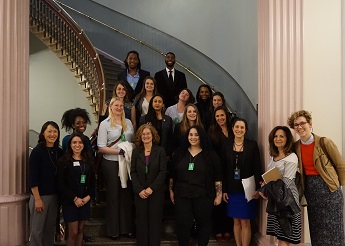Recommendations Released on College Sexual Assault
April 2014 marks an important step in our nation’s progress toward addressing violence against women on college campuses. FUTURES staff Casey Corcoran and Maya Raghu were at the White House when Vice President Biden released a report from the White House Task Force to Protect Students from Sexual Assault that addresses the dramatic changes that must take place if students are to be safe during their college years.
We collaborated with our partners—including the Gender Violence Program at Harvard Law School, National Women’s Law Center, National PTA, and Hollaback!—to submit feedback to the Task Force. We’re pleased to see some of our own recommendations make it into the final report, which calls for increased transparency and accountability, new tools for data collection, prevention programming, community partnerships, and trauma-informed responses that will help schools give students a safer college experience
However, we’re eager to see increased effort around several topics that weren’t as prominent in the recommendations:
- Partner with Parents
Parents are national experts on their children, but they’re often left out of the conversation. Parents deserve complete transparency on prevalence of sexual assaults on college campuses—and they should know that the most at-risk time for a college woman is the first 15 weeks of her first year, when young students are most vulnerable. - Know Your Numbers
High or low numbers alone can be misleading—they need to be explained in context of reporting rates, prevention strategies, and more. Knowing and understanding the real numbers can help schools build the right prevention and response strategies, and accurately measure success. - Speak Up and Bring Rape Culture Down
Encourage schools to implement more programs, workshops, and solutions that promote respectful attitudes on campus—starting the day first-year students step foot on campus. Engaging all bystanders, especially male leaders in athletic programs and fraternities on campus, is essential to changing the culture that tolerates rape and sexual assault. - Enforce the Laws
Let’s ensure that schools are enforcing the existing laws—including Title IX and the Clery Act—to hold them accountable for violence and harassment that takes place under their watch. Make sure your school has a Title IX coordinator on staff, and is transparent with their reporting practices. - Improve the Tools
Not every college health center in the U.S. has been given the tools and training required to serve their students. Access to trained counselors on campus is crucial, and the health centers are well positioned to take a leadership role in preventing and responding to violence that occurs both on and off campus. - Start Early
The problem of sexual assault on campus doesn’t begin or end in college. An increased focus on K-12 programs to educate young people and their parents about healthy relationships can help prevent violence before it starts.
Releasing the report was step one. Now the real work begins!





